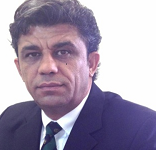
Omer Faruk Dogan
Numune Education and Training Center, Turkey
Title: The Management of Post-surgery Pediatric Heart Failure: Current and Future
Biography
Biography: Omer Faruk Dogan
Abstract
As we know that heart failure is a complex pathology that may be seen in children with congenital heart disease include development of cardiomyopathies due to myocarditis. In general, this severe clinical condition is associated with a high rate of morbidity and mortality and places a significant burden on families. Current medical and/or surgical treatment modalities are taken largely from the management of heart failure in adults, though clear survival benefit of these medications are lacking. There is no adequate published data on the overall prevalence or incidence of heart failure in children. However, the success of mechanical circulatory support in management of heart failure has raised the prospect of a previously unavailable treatment modality. Heart transplant remains the gold standard treatment, but the number of patients requiring this treatment far outweighs the donor availability.
It is therefore not surprising to see the popularity of various circulatory support modalities, with devices ranging from veno-arterial extra-corporeal membrane oxygenation (ECMO) to ventricular assist devices which have different properties such as pulsatile or continuous flow management. Indication, timing and the choice of the type of mechanical support are critical in order to avoid lethal complications. In many patients we can see that hemorrhage due to continuous anti coagulation requirement, thrombo-embolism and infections. In pediatric patients with heart failure, mechanical supporting system is used rarely for bridge to transplantation in many of centers. Active research is currently underway to develop newer and more durable devices that will assist the pediatric population across all age groups. The combined experience developed through the usage of different devices in pediatric and adult populations has led to the application of mechanical circulatory support in some subgroups of grown–up congenital heart diseases patients, particularly those with systemic right ventricular failure. Left and/or right ventricular assist programs and/or the use of Para corporeal supporting devices combined with indicators and VADs have taken an increasingly main role in the management of advanced heart failure in children. The predominant devices have been used for bridge to heart transplantation. Excellent results are currently achieved for most children who requiring surgery.
There is an ongoing investigation to improve outcomes in high-risk populations, such as small infants and those with complex congenital heart disease. Additionally, there is an active investigation and interest in expansion of VADs beyond the predominant utilization as a bridge to a heart transplant into ventricular recovery, device ex-plant without a heart transplantation (bridge to recovery), and placement of devices without the expectation of destination therapy. Survival four years after hospital admission has been reported as only 70%. In the United States, it is currently estimated that greater than five million adults have heart failure with projections reaching greater than eight million by 2030. The mortality at five-years after the diagnosis of heart failure remains at approximately 50%. The authors concluded that the costs of heart failure estimates in the United States will be $70 billion in the near future.
